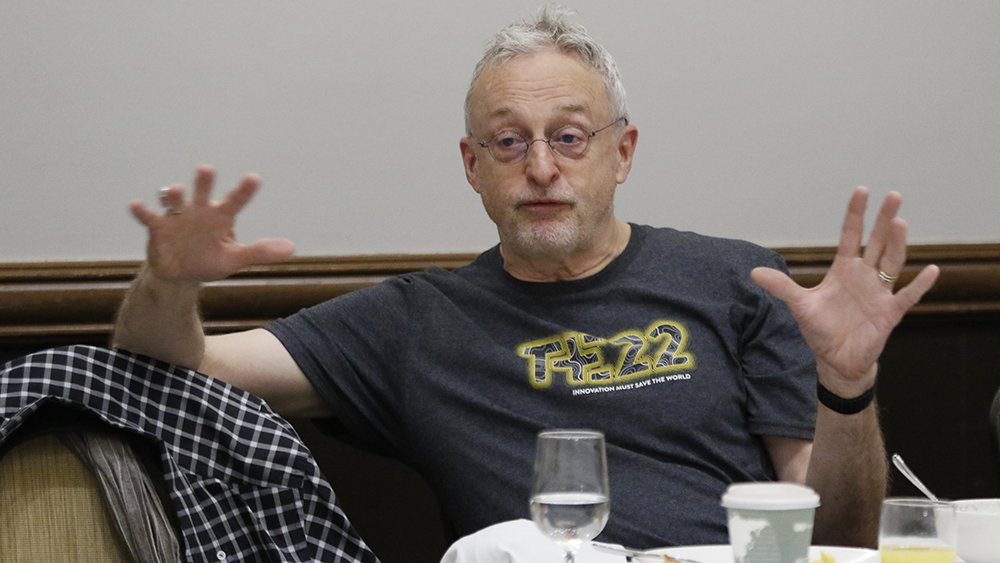I had a series of epiphanies at a breakfast session on “The Climate Innovation Opportunity” I moderated the other day at our Techonomy 2022 conference in Sonoma. Around the table in front of plates of eggs and toast were more than a few of the country’s leading thinkers about climate tech, climate investing, and climate action. Listening to them was powerful.
At that very moment, the internet industry, which I have been obsessively covering since its infancy, was more or less imploding. Meta and Amazon were each laying off more than 10,000 employees; Meta’s stock was down 75% in a year; an activist investor was, for the first time ever, demanding Alphabet/Google cut costs; and Elon Musk appeared to be willfully dismantling Twitter. I brought to the breakfast a conviction that a financial era was ending. While the net giants would all remain major profitable companies, no longer would they lead the world’s financial markets upwards, as they had for over a decade, creating the world’s first trillion-dollar companies in the process.

So as I sat there waiting for the breakfast to begin, I was ready for more than a discussion. I was ready to learn what would constitute the next era for business. Of course I didn’t realize it. That’s not what I thought the session was going to be about. But it was.
A few conclusions I came to from the discussion that morning:
- Global heating will become more pronounced and more obvious with every passing day from now on. And society’s primary task in coming years will be to adapt and respond to it.
- The next giant value-creation opportunity for business, investors, and the general public will be climate tech and climate action. The companies that invent the tools to take us to a carbon-free era, and those that remake their current businesses to thrive in an era of sustainability–will be where the money will be made in coming decades.
- It is irrational to deny this inevitability. This has to be true. Otherwise we are finished, as a thriving global human society.
- Business, not government, will lead the way to a carbon-free future. Unlike government, business and financial markets can evolve quickly and absorb innovation as it occurs.
- A climate industry is on the horizon. It will be just as clear-cut as today’s internet industry.
- The only way to defeat climate denial is with profit and wealth creation. You can’t deny a dollar. And the dollars will come to those who invest in climate solutions. The denialists, whether companies or individuals, will lose, and it will, soon enough, hurt them.
- Climate capital can build the next economic era. If we do have a recession in the next year or so, climate investment and action will bring us out of it.
- Markets will be driven in coming years by the companies that invent and deploy technologies and systems to combat global heating. The investors who get on board with those companies will be the ones who get the richest, just as was the case with early investors in Amazon, Apple, Facebook, Google, and Microsoft.
- Systems thinking will be essential to lead us to the most powerful climate solutions, and while nobody is very good at it, business will do better than government.
None of this means net companies won’t profit, or that tech will not be the central tool that gets us to the verdant valley of climate success. After all, we live in a digital society now, and it will be digital tools that take us into this potentially-glorious future of climate consciousness.
In fact, the companies that now lead in the cloud-computing era will likely thrive as a more monitored and managed world emerges. We can’t improve what we can’t measure, and data–stored, analyzed, and deployed–will be what drives us into the new era. Artificial intelligence will help climate action, climate business, and climate profit.

But it is a new era, just when we needed one. The old era, when investors thought Facebook would forever go to the moon is over.
Coda:
The day before the breakfast, two conference plenary sessions had helped me arrive at my epiphanies:
- Mike Schroepfer, longtime CTO of Facebook and Meta and now marshaling his wealth as a determined climate investor through his firm Additional Ventures, spoke with me on stage about his conviction that now, for the first time, software and other advances make it possible to “hyperscale” physical infrastructure for climate. We will, he says, be able to create the systems for an energy-efficient economy much faster than most have realized.
- And immediately after Schroepfer, we heard from Paul Hohenberger of TerraPraxis. Here was a proof point for Schroepfer’s thesis (and evidence of the radical potential for growth in a carbon-conscious age). TerraPraxis is a nonprofit that develops and deploys systems–based on sophisticated software and data–to enable coal plants to quickly transition away from coal to newer more efficient heat and energy-production sources. Next generation nuclear is expected to be the primary method, but geothermal and other options can also be incorporated. The point is to have processes in place that factor in all the various systems entailed in a coal plants and its connection to the existing grid, so that a templated approach can be applied quickly to thousands of plants over a very short period. Microsoft is a huge backer of TerraPraxis.
















